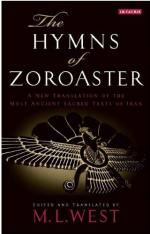|
This section contains 4,692 words (approx. 16 pages at 300 words per page) |

|
SOURCE: “Iranian Traditions” in The Heritage of Persia, World Publishing Company, 1963, pp. 15-52.
In the following excerpt, Frye reviews the controversy surrounding the dating of Zoroaster and his scriptures, outlines the differences between Zoroaster's teachings and other ancient beliefs, and comments on the influence of Zoroaster on the development of the Iranian epic tradition.
Zoroaster and His Message
Zarathushtra, or Zoroaster, as the Greeks called him, presents many problems, and it is discouraging that after so many years of research we do not know when or where he lived or even precisely his teachings. One may marshal the evidence and conclude that he was not one thing or did not live at a certain period, but positive information about the prophet and his time is conspicuous by its absence. Let us attempt to gather material relating to him, trying to group the less uncertain data first, and finally...
|
This section contains 4,692 words (approx. 16 pages at 300 words per page) |

|


